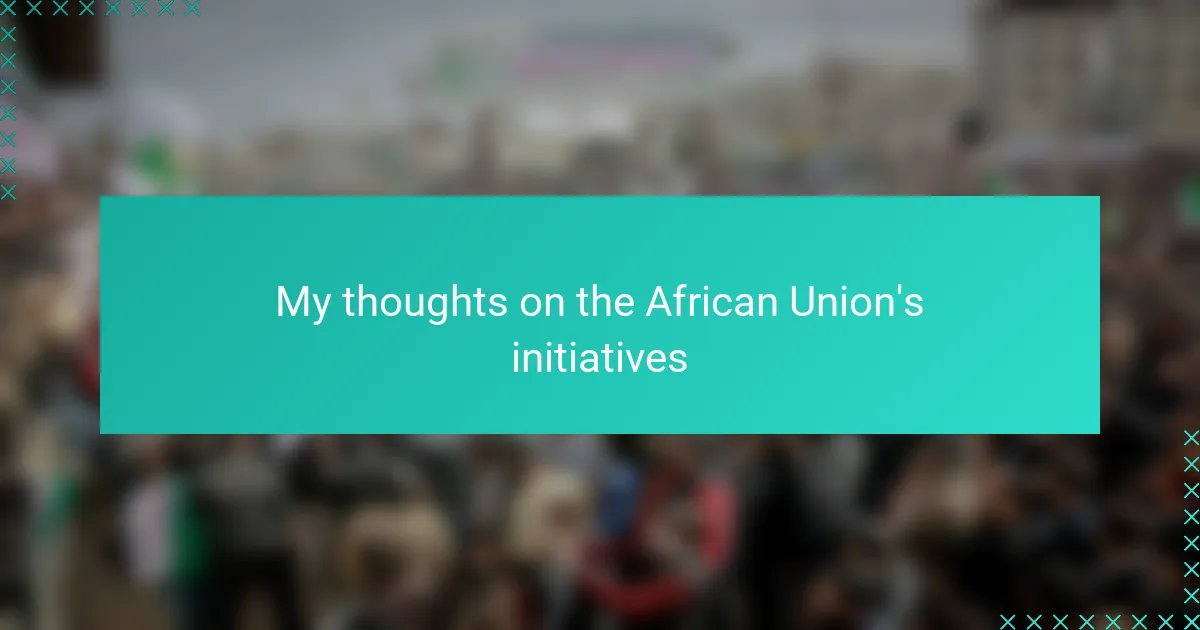Key takeaways
- The African Union (AU) serves as both a mediator in conflicts and a proponent of African sovereignty, navigating diverse national interests while promoting continental unity.
- Key initiatives include the African Continental Free Trade Area (AfCFTA) aimed at enhancing trade, the African Standby Force for peacekeeping, and significant infrastructure development for modernization.
- The AU faces challenges such as diversity among member states, funding dependency, and the need for political will to implement its policies effectively.
- Looking ahead, there is cautious optimism surrounding the AU’s ability to leverage digital transformation and infrastructure improvements for meaningful progress in Africa.
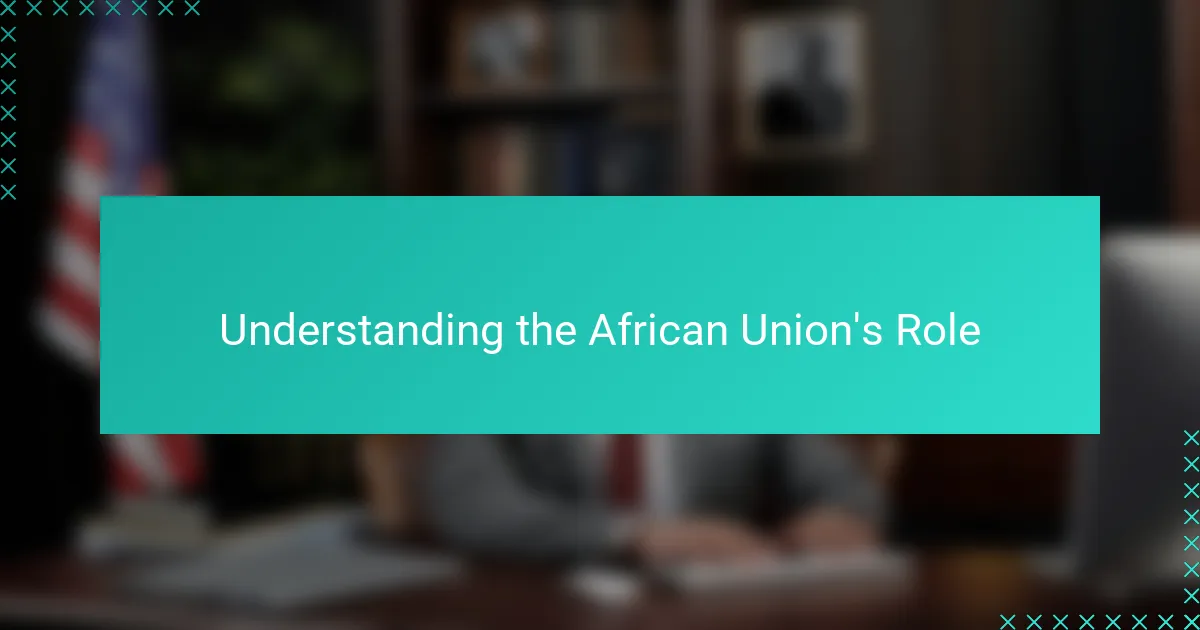
Understanding the African Union’s Role
When I first started following the African Union, I was struck by its ambitious vision to unite a diverse continent under common goals. It’s not just a political body; to me, it feels like an evolving experiment in continental cooperation, grappling with issues from peacekeeping to development. Have you ever wondered what it truly takes to balance so many different national interests while aiming for continental progress?
In my experience, understanding the AU’s role means recognizing its dual identity: it acts as both a mediator in conflicts and a champion of African sovereignty on the global stage. This balancing act often plays out in subtle ways that aren’t always visible in headlines, yet it shapes the everyday lives of millions. Observing how it engages with crises like regional conflicts reveals just how central the AU has become in Africa’s political landscape.
The AU’s approach to fostering unity feels like a continuous journey more than a fixed destination. It’s impressive—and sometimes frustrating—to see how the organization pushes for integration while dealing with persistent challenges like economic disparities and political instability. I often ask myself: can the AU truly transform Africa’s future without first addressing these internal contradictions? This tension is what makes its role endlessly fascinating to watch.
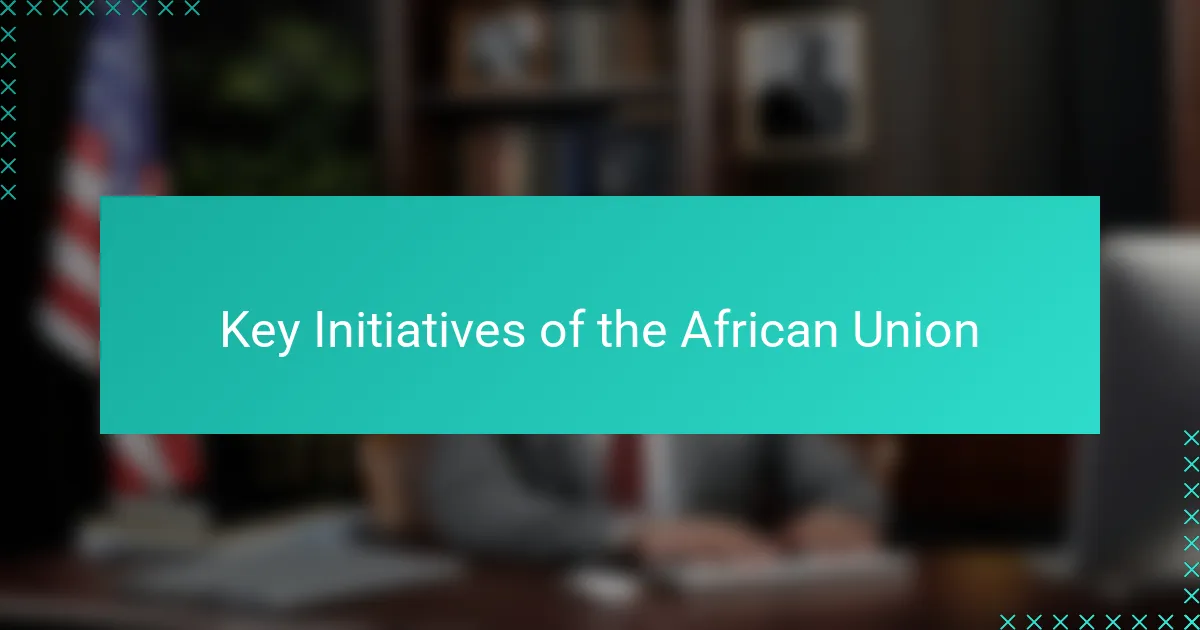
Key Initiatives of the African Union
One of the first AU initiatives that caught my attention is the African Continental Free Trade Area (AfCFTA). It’s remarkable because it aims to create the largest free-trade zone in the world by removing tariffs between African countries. I’ve often thought about how this could change everyday life, making goods more affordable and boosting local businesses, but I wonder—will the member states follow through on this bold vision?
Another initiative close to my heart is the AU’s peace and security agenda, particularly the African Standby Force. In my experience, peacekeeping isn’t just about deploying troops; it’s about building trust between communities torn apart by conflict. Watching the AU intervene in crisis zones has made me realize how complex and sensitive these operations are, and I can’t help but hope for more success stories that bring lasting stability.
Finally, the AU’s focus on infrastructure development and digital transformation feels like a game-changer for the continent. From roads that link remote areas to ambitious projects that enhance internet connectivity, I see these efforts as vital steps towards modernization. But I often pause to ask myself—can these initiatives bridge the gap between Africa’s potential and its current challenges quickly enough to benefit everyone? That tension keeps the conversation alive for me.
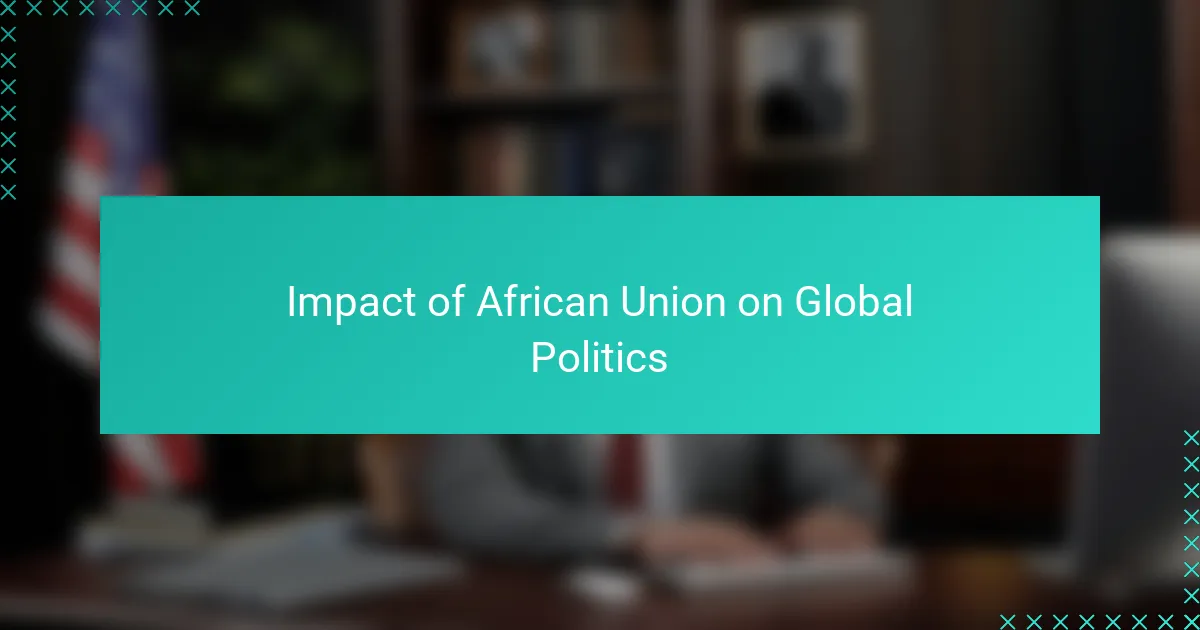
Impact of African Union on Global Politics
When I reflect on the African Union’s impact on global politics, I see a growing force that is gradually reshaping how Africa is perceived and engaged with on the world stage. It’s impressive how the AU has transformed from a mere regional group into a collective voice demanding respect and fairness in international affairs. Have you noticed how this shift challenges traditional power dynamics, making global politics a bit more inclusive?
From my perspective, the AU’s role in peacekeeping missions and conflict resolution stands out as one of its most tangible contributions to global stability. I’ve followed several instances where AU-led interventions helped de-escalate crises before global powers stepped in, signaling a new form of regional responsibility that commands attention. It makes me wonder: could this model inspire other regions to take ownership of their security issues?
What intrigues me most is the way the AU balances its ambition with the realities of diverse member states—each with its own interests and challenges—while still pushing for a unified presence worldwide. This balancing act is no small feat, and it often feels like watching a tightrope walker, steadying the continent amidst global political storms. Does this resilience hint at a future where Africa not only participates in but also shapes global agendas? I believe it does.
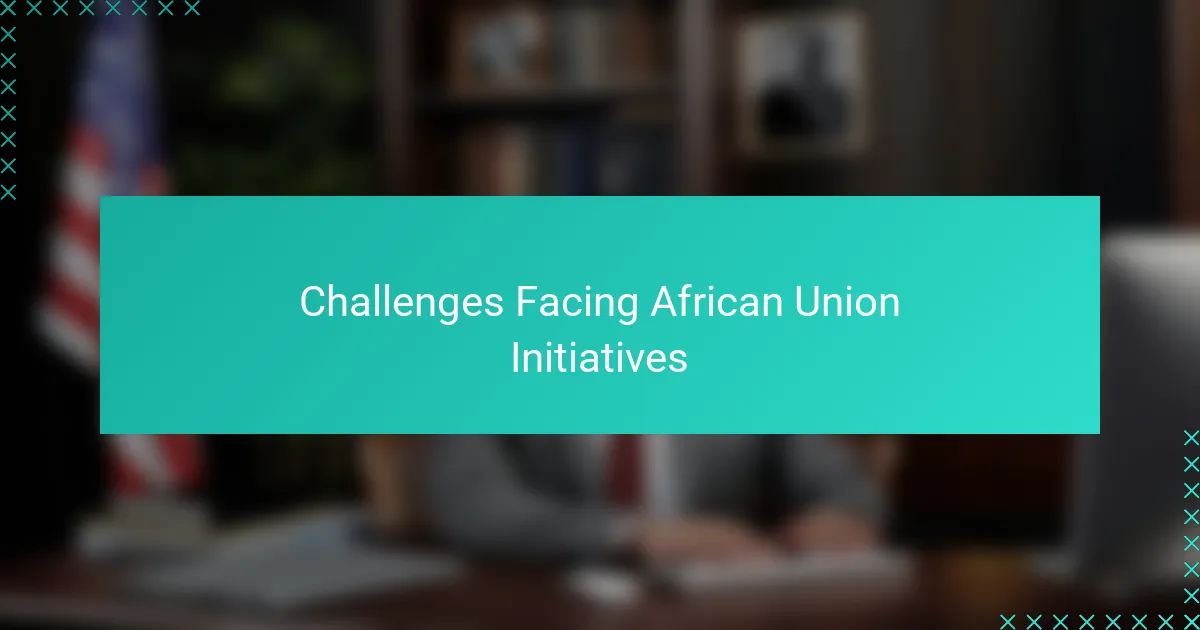
Challenges Facing African Union Initiatives
One challenge that constantly stands out to me is the sheer diversity among AU member states. With over 50 countries each carrying different political systems, economic strengths, and historical backgrounds, aligning their priorities feels like trying to conduct an orchestra without a common score. I often wonder how the AU manages to keep everyone on the same page when even the most pressing issues can spark differing opinions.
Funding is another area that I find particularly concerning. From what I’ve observed, many AU initiatives rely heavily on external donors and partners, which sometimes hampers the organization’s ability to act swiftly and independently. It makes me question how the AU can build financial self-reliance while avoiding the pitfalls of donor-driven agendas that may not always align with African interests.
Then there’s the persistent issue of political will and enforcement. Even when the AU comes up with ambitious policies and protocols, their implementation often falls short due to lack of commitment or capacity at the national level. I’ve seen instances where Member States hesitate to surrender sovereignty or enforce decisions that might upset internal power balances. How can the AU ensure that its initiatives move beyond paper promises into real, measurable change? That’s a question that keeps me thinking.
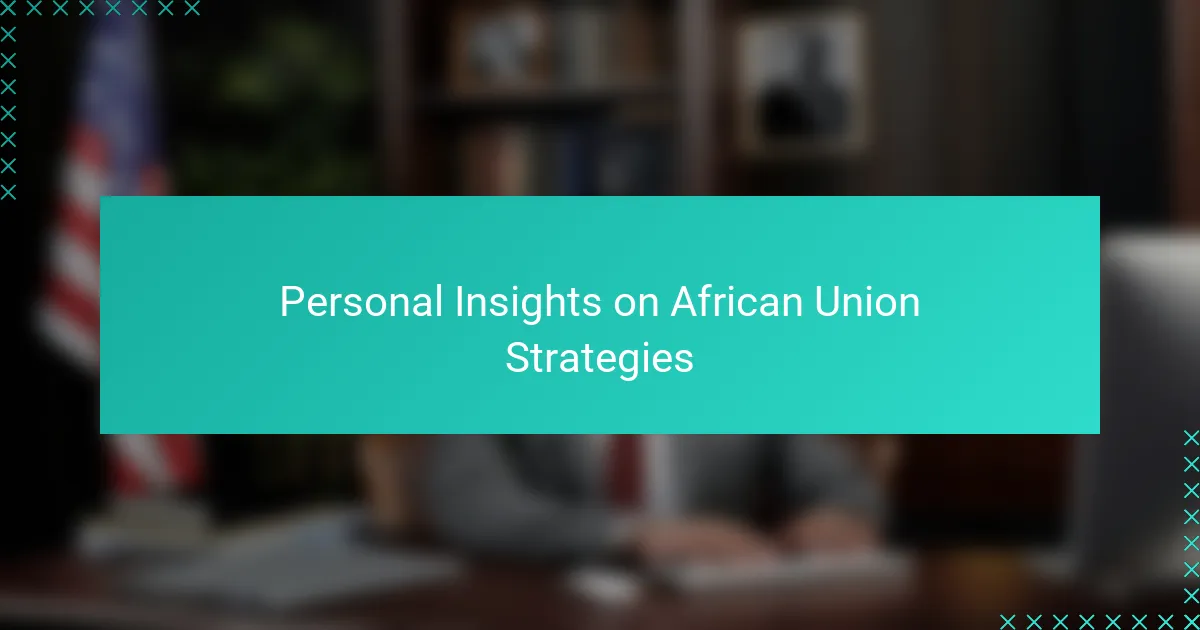
Personal Insights on African Union Strategies
Looking closely at the AU’s strategies, I’m struck by their ambition to address deep-rooted issues while still aiming high on integration and development. It’s clear to me that these strategies don’t just reflect policy—they reveal a hopeful drive to reshape Africa’s future despite complex realities. I often find myself admiring this blend of idealism and pragmatism, wondering how many other organizations balance these forces so delicately.
From my perspective, the AU’s emphasis on regional cooperation is both its greatest strength and toughest challenge. Coordinating over 50 nations, each with unique priorities, makes me think about what it takes to maintain momentum without losing focus. How do these strategies stay alive and effective when so many variables are constantly shifting? That ongoing balancing act fascinates me—it’s like watching a giant puzzle slowly come together, piece by piece.
At times, I can’t help but empathize with the AU’s leaders, who push forward ambitious economic plans and peace initiatives knowing the path is riddled with setbacks. Reflecting on this, I feel that these strategies carry not only political weight but also a heavy emotional burden. It makes me ask myself: what keeps their resolve intact amid so much uncertainty? To me, it’s a reminder that behind every grand policy, there’s a story of perseverance and hope.
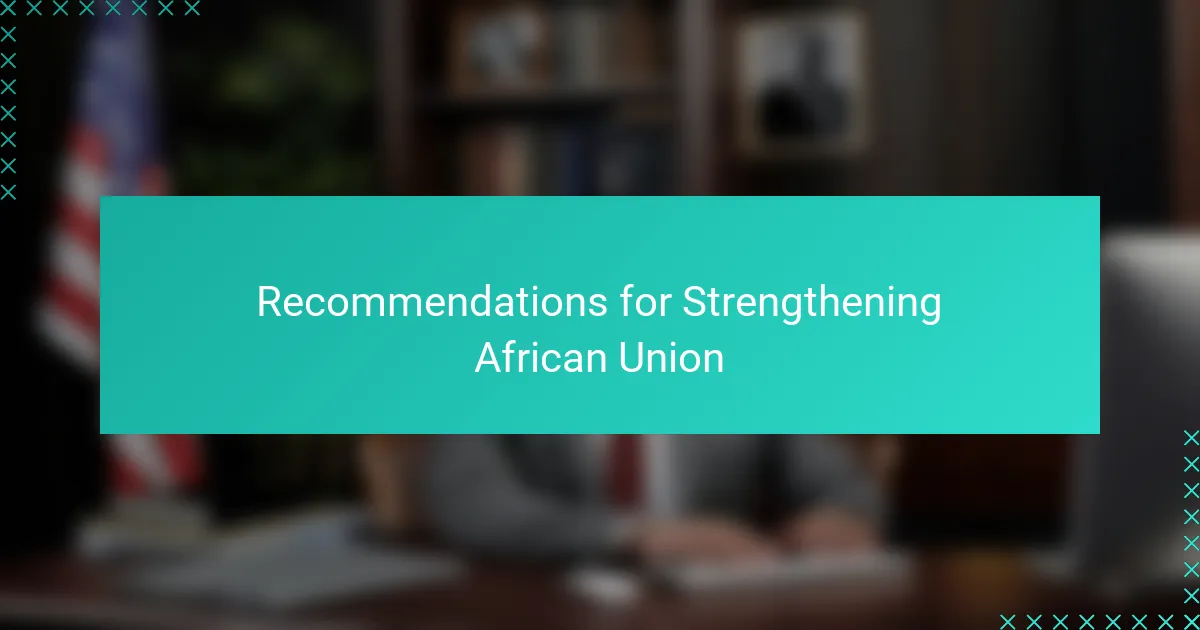
Recommendations for Strengthening African Union
Building stronger financial independence strikes me as an essential step for the African Union. I’ve seen how reliance on external donors can sometimes slow down urgent actions or sway priorities away from Africa-centered solutions. Wouldn’t it be transformative if the AU could harness more resources internally, creating a self-sustained model that guarantees agility and ownership over its initiatives?
Effective enforcement mechanisms also come to mind when thinking about what the AU needs to improve. Policies are great, but I’ve noticed too many times that without real political commitment at the national level, those policies remain words on paper. How can the AU inspire member states to move beyond hesitations about sovereignty and actually implement continental decisions? It feels like this hinges on building stronger trust and shared accountability.
Lastly, I’m convinced that enhancing communication and shared vision among member states is vital. Coordinating more frequently—with openness and transparency—could help ease the tension inherent in such a diverse group. Could fostering a culture of mutual understanding transform the AU from a collection of independent voices into a truly unified chorus? From what I’ve seen, that would be a game-changer for Africa’s future.
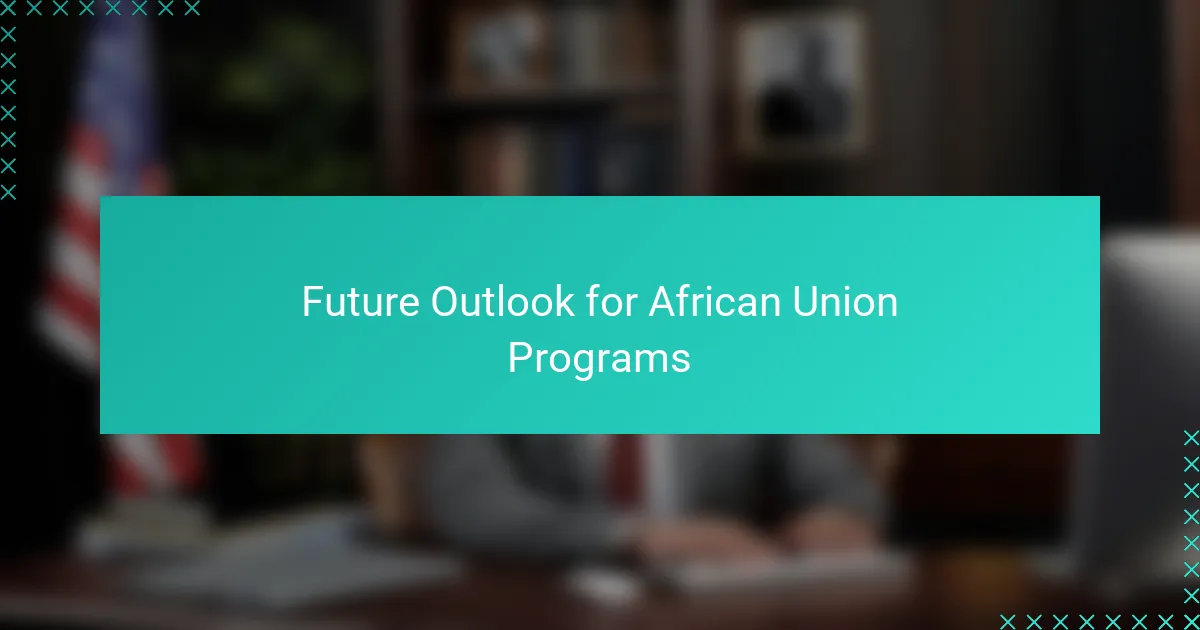
Future Outlook for African Union Programs
Looking ahead, I see the African Union’s programs teetering between great promise and daunting complexity. From what I’ve observed, initiatives like the AfCFTA could redefine trade dynamics across the continent, but I ask myself—can the AU navigate the political will and infrastructure gaps quickly enough to make this vision real? It’s a race against time and entrenched challenges, yet the potential payoff feels monumental.
Another aspect that catches my attention is the AU’s growing emphasis on digital transformation and infrastructure development. I imagine a future where improved connectivity links rural communities to markets and education, but I also feel the weight of skepticism—will funding and political commitment keep pace with technological ambitions? That tension between vision and reality seems to be a defining characteristic of AU programs for years to come.
Ultimately, I’m cautiously optimistic about the AU’s future. Despite the hurdles, the persistent drive I’ve witnessed in leaders and communities alike gives me hope. Could this enduring determination be the spark that turns grand continental goals into tangible progress? Only time will tell, but I remain engaged, eager to see how this journey unfolds.
